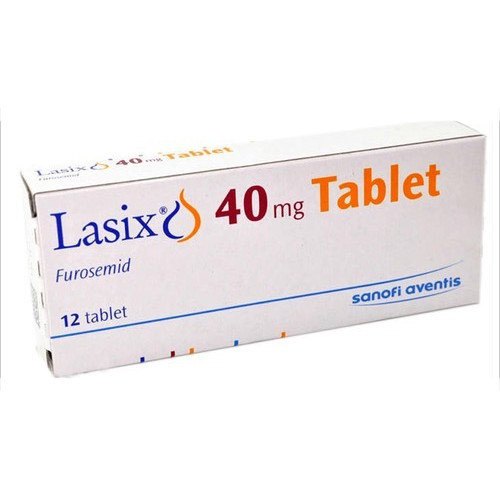lasix FUROSEMIDE
Introduction to Lasix
Lasix, known generically as Furosemide, is a widely used medication in the medical field, primarily for its potent diuretic properties. It is commonly prescribed to help manage fluid retention (edema) and swelling caused by various medical conditions, such as heart failure, liver disease, and kidney disorders. Lasix functions by promoting the removal of excess fluid and salt from the body, thereby reducing the burden on the heart and improving overall circulatory efficiency. Available in multiple forms, including tablets, injections, and syrups, Lasix offers versatile options for treatment based on individual patient needs.
Composition of Lasix
The active ingredient in Lasix is Furosemide, a powerful loop diuretic. Furosemide works by inhibiting the absorption of sodium and chloride in the kidneys, specifically in the loop of Henle, a part of the renal tubule. This action leads to increased urine production, which helps to expel excess fluid and reduce swelling. By efficiently eliminating excess sodium and water, Furosemide aids in managing conditions associated with fluid overload, thereby enhancing patient comfort and health outcomes.
Uses for Lasix
- Management of edema associated with congestive heart failure, liver cirrhosis, and renal disease.
- Treatment of hypertension (high blood pressure) as part of a comprehensive treatment plan.
- Relief from symptoms of fluid retention and swelling.
- Management of pulmonary edema and other conditions requiring rapid fluid removal.
Side Effects of Lasix
- Dehydration and electrolyte imbalances (e.g., low potassium levels).
- Increased urination frequency.
- Dizziness or lightheadedness, especially when standing up quickly.
- Hearing loss or ringing in the ears, particularly with high doses.
- Skin rash or itching.
Precautions of Lasix
Before using Lasix, it is crucial to inform your healthcare provider of any allergies or pre-existing medical conditions. Patients with kidney problems, liver disease, or electrolyte imbalances should use Lasix with caution. Regular monitoring of kidney function and electrolyte levels is recommended during treatment. It's important to stay adequately hydrated and follow dietary recommendations provided by your healthcare provider. Avoid abrupt changes in posture to prevent dizziness, and consult your doctor before starting or stopping any medication.
Specifications of Lasix
Lasix is available in multiple forms to accommodate different patient needs:
- Tablets: Typically prescribed for long-term management of conditions requiring diuretic therapy.
- Injection: Used in acute settings where rapid diuresis is necessary, such as in hospitals.
- Syrup: An alternative for patients who have difficulty swallowing tablets, providing the same therapeutic benefits.
Conclusion
Lasix, with its active ingredient Furosemide, is an essential medication in the management of edema and hypertension. Its ability to effectively reduce fluid overload makes it invaluable in treating conditions like heart failure and kidney disease. While generally safe, it is crucial to use Lasix under the guidance of a healthcare provider to minimize potential side effects and ensure optimal outcomes. By understanding its uses, side effects, and precautions, patients can better manage their health and improve their quality of life.


Can Lasix be taken safely while pregnant?
Lasix is not recommended during pregnancy unless absolutely necessary. Limited evidence exists on its safety, and it may affect the baby's development. If you're pregnant or planning to become pregnant, talk with your doctor about the safest way to manage your condition during this time.

Can I take Lasix with other prescription drugs?
Lasix can interact with other medications, increasing the risk of side effects. It may interact with blood pressure medications, increasing the risk of low blood pressure. It can also interact with certain antibiotics, increasing the risk of kidney damage. Always inform your doctor about all medications you take to avoid potential interactions.

Does Lasix affect appetite?
Lasix doesn't typically affect your appetite. Most people taking this medication don't notice changes in how hungry they feel. If you notice any unexpected changes in your appetite after starting Lasix, talk with your doctor. They can help determine if these changes are related to the medication or another cause.

Does Lasix affect mood?
Lasix doesn't typically cause mood changes. Most people take this medication without experiencing anxiety or agitation. If you notice changes in your mood after starting Lasix, talk with your doctor. These symptoms might be related to something else, like stress or another health condition, rather than the medication itself.

Does Lasix affect sleep?
Lasix doesn't typically cause sleep problems. Most people take this medication without experiencing changes in their sleep patterns. If you notice changes in how well you sleep after starting Lasix, talk with your doctor. Sleep problems might be related to something else, like another medication or a different health condition.

Does Lasix cause headaches?
Headaches can occur with Lasix, but they are not common. If you experience mild headaches, staying hydrated and resting may help. Over-the-counter pain relievers can also be used after consulting your doctor. If headaches are severe or persistent, talk with your healthcare provider to determine if they are related to Lasix or another cause.

Does Lasix cause stomach upset?
Lasix can occasionally cause stomach upset, including nausea or diarrhea. These effects are usually mild. Taking the medication with food might help reduce discomfort. If you experience severe or persistent stomach issues, talk with your doctor to determine if they are related to Lasix or another cause.

Does Lasix cause weight gain?
Lasix can cause weight loss due to fluid removal from the body. This effect is usually mild and occurs as the medication helps reduce fluid retention. If you notice significant or rapid weight changes, talk with your doctor. They can help determine if these changes are related to Lasix or another cause.

Does Lasix interfere with sexual function?
Lasix doesn't typically cause sexual side effects like erectile dysfunction or loss of libido. Most people take this medication without noticing changes in their sexual function. However, if you experience any changes in your sexual health while taking Lasix, it's important to talk with your doctor. They can help determine if your symptoms are related to the medication and recommend appropriate treatment to address any issues.

Does Lasix limit driving?
Lasix might affect your ability to drive safely. It can cause dizziness or light-headedness, especially when you stand up quickly. If you feel dizzy or faint after taking Lasix, avoid driving until these symptoms go away. Pay attention to how your body responds before getting behind the wheel.

Does Lasix make it hard to think or concentrate?
Lasix doesn't typically cause thinking problems or concentration difficulties. Most people take this medication without experiencing changes in mental focus. If you notice problems with your thinking after starting Lasix, talk with your doctor. These symptoms might be related to something else, such as dehydration or another health condition.

Does Lasix make people tired or drowsy?
Lasix doesn't typically cause tiredness or drowsiness. Most people take this medication without feeling unusually tired. If you notice you're feeling very sleepy or fatigued while taking Lasix, talk with your doctor. Your tiredness might be caused by something else, like another medication or an underlying health condition.

For how long do I take Lasix?
Lasix is usually a long-term medication for managing conditions like heart failure and hypertension. You'll typically take it every day as a lifelong treatment unless your doctor suggests otherwise. Stopping this medication without medical advice could cause your conditions to worsen. Always talk with your doctor before changing or stopping your Lasix treatment.

How does Lasix work?
Lasix works by blocking the reabsorption of sodium and chloride in the kidneys, which increases urine production. This process helps remove excess fluid and salt from the body, reducing swelling and lowering blood pressure. Think of it like a sponge squeezing out extra water. This makes Lasix effective for treating conditions like edema and hypertension.

How do I know if Lasix is working?
Lasix treats conditions like edema and hypertension. You'll know it's working if you notice reduced swelling and lower blood pressure. Your doctor may monitor your progress with blood pressure checks and blood tests to assess kidney function and electrolyte levels. Regular check-ups are important to ensure the medication is effective.

How do I take Lasix?
Lasix is usually taken once or twice daily, often in the morning and sometimes in the afternoon. It's best to take it on an empty stomach, but you can take it with food if it upsets your stomach. Swallow the tablet whole; do not crush or chew it. If you miss a dose, take it as soon as you remember unless it's almost time for your next dose. Avoid taking two doses at once. Always follow your doctor's specific instructions.

How long does it take for Lasix to start working?
Lasix starts working within an hour of taking it, with its effects peaking in about 1 to 2 hours. The full therapeutic effect may take a few days to become noticeable, especially for conditions like hypertension. How quickly it works can depend on your kidney function and overall health. Take it exactly as prescribed for the best results.

How should I store Lasix?
Store Lasix at room temperature, away from moisture and light. Keep it in a tightly closed container. Don't store it in humid places like bathrooms. If your pills came in packaging that isn't child-resistant, transfer them to a container that children can't easily open. Always store Lasix out of children's reach.

Is Lasix effective?
Lasix is effective for treating conditions like edema, which is fluid retention, and hypertension, which is high blood pressure. It works by helping your kidneys remove excess fluid and salt from your body. Clinical studies support its effectiveness in reducing fluid buildup and lowering blood pressure, improving health outcomes for many patients.

Is Lasix safe for the elderly?
Elderly individuals are more vulnerable to the side effects of Lasix, such as dehydration and electrolyte imbalances. These can lead to dizziness or falls. Lasix is generally safe for the elderly when used under close medical supervision. Regular monitoring of kidney function and electrolytes is important to ensure safety.

Is it safe to drink alcohol while taking Lasix?
It's best to avoid alcohol while taking Lasix. Alcohol can increase the risk of dehydration and low blood pressure, which are side effects of Lasix. If you choose to drink occasionally, limit your intake and watch for symptoms like dizziness or lightheadedness. Talk with your doctor about alcohol use while taking Lasix.

Is it safe to drink coffee or tea while taking Lasix?
You can drink coffee and tea while taking Lasix, but in moderation. Both Lasix and caffeine can increase urination, which might lead to dehydration. Make sure to drink plenty of water throughout the day. If you feel dizzy or lightheaded, these could be signs of dehydration, so talk with your doctor.

Is it safe to exercise while taking Lasix?
You can exercise while taking Lasix, but be cautious. This medication increases urination and can cause dehydration, leading to dizziness during exercise. Drink plenty of water before, during, and after physical activity. If you feel dizzy or weak, slow down or stop exercising and rest. Consult your doctor if you have concerns.

What are Lasix possible harms and risks?
A side effect is an unwanted symptom caused by medical treatment. Common side effects of Lasix include increased urination, dizziness, dehydration, low blood pressure, and electrolyte imbalance. These effects vary in frequency, with increased urination being very common. It's important to note that new symptoms can occur when starting any medication, which may be unrelated or temporary. Always consult a healthcare provider before stopping any medication.

What disease or symptom is Lasix used for?
Lasix is used to treat edema, which is fluid retention, and hypertension, which is high blood pressure. It helps remove excess fluid and salt from the body, reducing swelling and lowering blood pressure. Lasix can be used alone or with other medications, depending on your specific health needs.

What is Lasix?
Lasix is a diuretic, which is a type of medication that helps remove excess fluid from the body. It works by increasing the amount of urine your kidneys produce. Lasix is primarily used to treat conditions like edema, which is fluid retention, and hypertension, which is high blood pressure. It can also be used for other conditions as determined by your doctor.

What is the usual dose of Lasix?
The usual starting dose of Lasix for adults is 20 to 80 mg per day, taken as a single dose or divided into two doses. Your doctor may adjust the dose based on your response and needs. The maximum recommended dose is typically 600 mg per day. For children and the elderly, dose adjustments may be necessary. Always follow your doctor's specific dosing instructions.

Who should avoid taking Lasix?
Don't take Lasix if you're allergic to it or its ingredients. It's contraindicated in people with severe electrolyte imbalances or kidney failure. Caution is needed for those with liver disease or diabetes. Always consult your doctor about these concerns to ensure safe use of Lasix.
Available in 2 variations

strip of 15 tablets

Lasix Injection 4ml
vial of 4 ml injection














.svg)
